Surgery
The Dubai Equine Hospital maintains 3 Board Certified surgeons. The surgeons are fully trained in all areas of surgery but each was selected for their areas of specialization.
The hospital surgery in the fields of orthopedics:
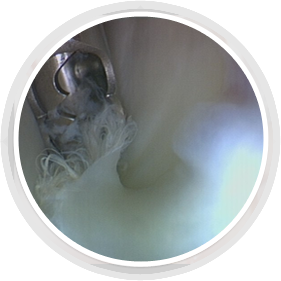
Arthroscopic intervention:
Selected when minimally invasive approaches will allow for correction of the abnormalities. A small 4 mm telescope is inserted into the joint and while the joint is inflated with sterile fluids the surgeon can remove the diseased tissues. This form of surgery is considered one of the safest techniques in equine surgery with complication rates as low as 1 in 100,000 cases. With the magnification provided from the telescope this type of surgery allows the surgeons at the DEH to perform very precise procedures.
Selected when minimally invasive approaches will allow for correction of the abnormalities. A small 4 mm telescope is inserted into the joint and while the joint is inflated with sterile fluids the surgeon can remove the diseased tissues. This form of surgery is considered one of the safest techniques in equine surgery with complication rates as low as 1 in 100,000 cases. With the magnification provided from the telescope this type of surgery allows the surgeons at the DEH to perform very precise procedures.
Internal fixation:
Both simple and complex fractures can often be fixed with only compression screws. By performing the insertion of the screws through small stab incisions the cases can be managed with less risk of infection and less damage to the soft tissues. Both of these advantages increase the chances that the animal can heal with no long-term pain or reduced function. Some complex fractures require numerous fractures to repair the damage.
Both simple and complex fractures can often be fixed with only compression screws. By performing the insertion of the screws through small stab incisions the cases can be managed with less risk of infection and less damage to the soft tissues. Both of these advantages increase the chances that the animal can heal with no long-term pain or reduced function. Some complex fractures require numerous fractures to repair the damage.
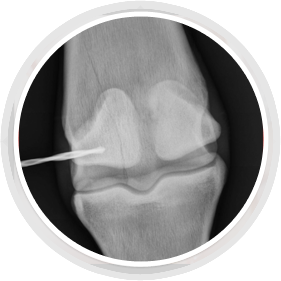
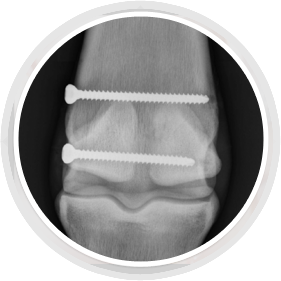
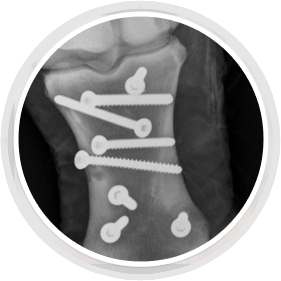
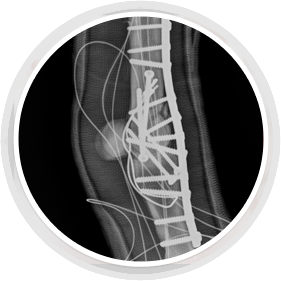
Arthrodesis techniques:
Some fractures require radical open repair to help provide a good quality of life. While these types of repair do not allow the animal to be athletic they are designed to allow the animal a comfortable life and breeding potential.
Some fractures require radical open repair to help provide a good quality of life. While these types of repair do not allow the animal to be athletic they are designed to allow the animal a comfortable life and breeding potential.
Laparoscopic intervention:
Laparoscopic techniques use minimally invasive techniques to explore body cavities. These techniques use a 10 mm telescope that can be inserted into the body. While the patient is inflated with sterile gas the scope can be used to examine the contents of the body. These techniques are used to search for retained testicles, spay mares, and explore the abdomen and chest to search for neoplasia. In this video the scope is being used to ligate the ovarian pedicle to spay a mare.
Laparoscopic techniques use minimally invasive techniques to explore body cavities. These techniques use a 10 mm telescope that can be inserted into the body. While the patient is inflated with sterile gas the scope can be used to examine the contents of the body. These techniques are used to search for retained testicles, spay mares, and explore the abdomen and chest to search for neoplasia. In this video the scope is being used to ligate the ovarian pedicle to spay a mare.
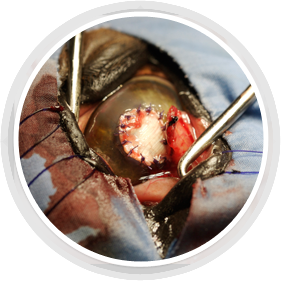
Ophthalmic techniques:
The Middle East is a region with a high incidence of diseases affecting the eyes of horses. Some of the most aggressive of these are melting corneal ulcers. The surgeons at the DEH are skilled in treating these lesions with routine procedures such as keratectomies and conjunctival flaps. Due to the aggressive nature ulcers seen in this region the clinic has developed techniques that are unique to this region. In this image a fascial flap is being used to cover a large deep ulcer. This animal ended up having visual eye at the end of the treatment.
The Middle East is a region with a high incidence of diseases affecting the eyes of horses. Some of the most aggressive of these are melting corneal ulcers. The surgeons at the DEH are skilled in treating these lesions with routine procedures such as keratectomies and conjunctival flaps. Due to the aggressive nature ulcers seen in this region the clinic has developed techniques that are unique to this region. In this image a fascial flap is being used to cover a large deep ulcer. This animal ended up having visual eye at the end of the treatment.
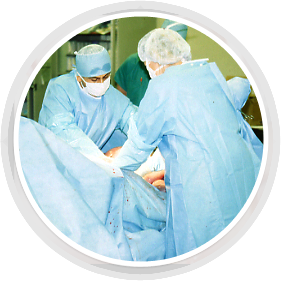
Colic surgery:
Colic is one of the most common life-threatening abnormalities seen in horses. The DEH is the premier regional facility for treatment of these conditions. We employ a team of surgeons with extensive experience in the treatment of colics from simple displacements to aggressive small and large intestinal resections.
Colic is one of the most common life-threatening abnormalities seen in horses. The DEH is the premier regional facility for treatment of these conditions. We employ a team of surgeons with extensive experience in the treatment of colics from simple displacements to aggressive small and large intestinal resections.

